
In early May, PaperTyper revealed its plans to conduct a research study on the influence of artificial intelligence (AI) tools on the academic achievements of college students. The objective was to investigate the effects of AI usage on the learning experience. Being a comprehensive online platform for academic support, PaperTyper AI was eager to gain insights into the real impact of AI on the learning process. To achieve this, they surveyed 1,000 students from full-time and part-time programs throughout the United States.
First Things First
Firstly, we initiated a search for student volunteers who will exclusively rely on generated content for their writing assignments, project research, idea development, and spell and grammar checks for three weeks.
Main Experiment’s Rules and Terms
Following the experiment, the Research Team at PaperTyper conducted interviews with the participants, wherein they discovered various emerging themes and patterns that revolved around the impact of AI tools on both the learning process and academic performance.
● Before committing to the study, participants were fully informed about its purpose and procedures.
● The study participants knew they could withdraw from the study whenever they wanted.
● The gathered data was kept safe and could only be accessed by the research team.
● PaperTyper promoted the conscientious utilization of artificial intelligence technology.
Effects of AI tools on academic performance.
Technology-related factors
In examining how artificial intelligence affects students, we tried to investigate different aspects and factors that could have an impact. Therefore, we focused on technology-related elements like students' access to digital resources, the incorporation of digital tools in education, and the level of technology literacy among students.
According to the surveyed students, their colleges utilize digital tools for tasks like accessing materials, participating in discussions, and grading assignments. Students receive digital educational resources such as digital textbooks, e-books, and online materials. However, some students still need help to use Microsoft Excel and Word and manage documents on their laptops.
Artificial intelligence has transformed the environment in which learning takes place. Tasks and operations are now automated, and information is readily available. However, I am still determining the accuracy of the information I utilize. While acquiring knowledge has become more straightforward, it is retained in my mind briefly. I only managed to memorize a small amount of data.
PaperTyper provided a selection of AI-based tools for the experiment, although only some of them were known by the students. While ChatGPT was already familiar to all students and utilized by them, they needed to enhance their understanding of prompt engineering. Additionally, some students mentioned using QuillBot, which should have been included in the provided tools.
Before the experiment, I was unfamiliar with many of the tools required. Consequently, I had to invest significant time into understanding and testing them. I particularly appreciate tools that simplify intricate ideas and grammar checkers. Although I still have much to learn about utilizing the remaining instruments, especially AI tools, I may require additional training. (Sandy, 18 years old)
Factors related to an individual's health, encompassing both their physical and mental well-being
All students agreed that AI tools bolster efficiency, aid in accessing valuable resources, and support a range of academic activities.
They also mentioned the drawbacks of utilizing the tools. All students acknowledged that whenever they encounter difficulty in solving a question or task, they immediately rely on ChatGPT to provide them with an answer. Moreover, they experienced anxiety and helplessness when ChatGPT is not functioning correctly. The students observed that engaging in multiple tasks and switching between different tools and platforms can result in mental overwhelm. Additionally, they expressed concerns about possibly being accused of plagiarism while using AI tools for studying, particularly ChatGPT. The survey revealed that 15% of the participants had been caught or faced the consequences of employing artificial intelligence assistants.
According to the survey participants, they have begun reducing face-to-face communication. When they require assistance, clarification, or guidance regarding academic matters or personal issues, they are more inclined to seek support from AI-driven tools rather than approaching a professor, classmates, or counselor.
I need help to write down what is being dictated to me. My notes could be better, and I frequently rely on my friends for assistance. However, I have started using a tool that converts spoken words into written text, which has simplified the learning process. Nevertheless, I have concerns about being able to take dictation independently without any external aid in the future (Lucy, 19 years old).
We inquired if they adhered to the physical activity guidelines set by the WHO, which include engaging in 150-300 minutes of moderate-intensity physical activity or 75-150 minutes of vigorous-intensity physical activity. Each person reported engaging in some level of regular physical activity. Yet, they also noted an increased amount of time spent directly in front of their laptop and smartphone screens. On average, they now spend an additional 80 minutes using these devices. The reasons cited for this increase include the desire to experiment with these tools, the difference between expectations and reality, and a need for clarity on effectively utilizing them.
Respondents' responses indicate a clear link between the continuous utilization of tools and a decline in self-assurance. They began to experience unease regarding their future, as the emergence of ChatGPT and other AI-driven tools could potentially result in heightened competition and, subsequently, decreased wages. As juniors, they need to feel more confident in this competitive environment.
Person-specific elements like motivation, preferred method of learning, personal motivation, and strategies for studying
Although AI tools can assist, students must consider their learning preferences and requirements.
Ensuring a well-rounded learning experience involves a crucial balance between AI tools and a comprehensive approach encompassing critical thinking, active engagement, and seeking diverse knowledge resources.
I am a student from another country, and although I am proficient in English, it is still my second language. Therefore, I rely on various tools to ensure my spelling and grammar are correct. I attempted to use voice tools in the past, but they rarely understood what I was saying, possibly due to my accent. This often became frustrating. Occasionally, I turn to ChatGPT for assistance, although it feels somewhat artificial. If I have any questions, I find it more helpful to engage with my school community, Discord, or other forums where native English speakers can provide insightful information. (Arjun, 18 years old)
In the survey, the students also expressed their thoughts on using AI-based tools throughout the experiment. They believe these tools can serve as assistants but acknowledge that they are crucial in generating ideas based on their perspectives and vision. They argue that with their input, there would be more room for authentic creative learning, as it would simply involve replicating others' ideas.
Additionally, they conveyed their skepticism about entirely depending on AI for educational purposes. They perceive it as a potentially precarious move to assign the complete task to Chat GPT. Thus, they only utilize the tool to some extent. They believe that ChatGPT cannot produce a well-crafted essay. The participants asserted that the device reproduces content from other suitable sources based on the prompt. Moreover, this only holds if the prompt is unambiguous and accurate.
Technology and Learning
Students said they utilized online learning management systems, virtual classrooms, and digital educational resources.
The participants needed more time to learn and explore the unfamiliar AI tools offered by PaperTyper.
Health and AI Tools
Students acknowledged the advantages of AI tools in improving efficiency and gaining access to valuable resources.
Worries about excessive dependence on AI could result in reduced face-to-face interaction with instructors, peers, or guidance counselors.
Physical Activity and Self-Confidence
The students who heavily relied on AI tools experienced a decline in their physical activity levels.
Long-term utilization of artificial intelligence tools was linked to lowered levels of self-assurance, primarily due to concerns about employment opportunities in a competitive market significantly impacted by advancements in AI.
Importance of Critical Thinking
Students highlighted the importance of critical thinking and active involvement in learning, even though AI tools proved helpful for grammar and spelling checks.
The participants also emphasized the importance of searching for various sources of knowledge.
Preventing plagiarism and over-reliance on unreliable information:
The participants highlighted the significance of maintaining their viewpoint and ability to think critically to avoid plagiarism and dependence on incorrect information.
Legality and Legitimacy
PaperTyper's Research Team conducted their research by ethical guidelines, guaranteeing the study's legality and legitimacy. Before participation, all individuals were given comprehensive information regarding the research's objectives and procedures. They were informed that their involvement was voluntary and that they could withdraw at any point.
The research team ensured the confidentiality and privacy of participants' information by securely handling and storing the collected data, allowing only the team to access it.
Throughout the study, PaperTyper advocated for the conscientious and moral utilization of artificial intelligence technology to prevent academic dishonesty.
The statement of endorsement may not be expressed or implied by PaperTyper towards any AI-powered tool, service, or brand mentioned in this research. The information provided is solely for informational purposes and does not signify a recommendation or preference from PaperTyper. Users are advised to independently evaluate and consider the tools or services that align with their requirements. PaperTyper supports the importance of maintaining academic honesty.
The PaperTyper Team maintained regular communication with all participants to encourage their use of AI-based tools during the study period. However, we cannot verify this and instead have to trust the participants' responses based on their honesty.




